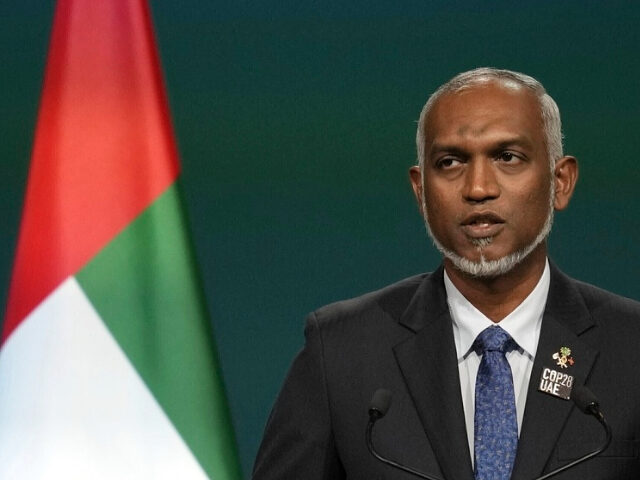The state minister at the Ministry of Climate Change, Environment and Energy for the Maldives, Fathimath Shamnaz Ali Saleem, was detained and suspended from her position on accusations of committing acts of “sorcery” on President Mohamed Muizzu, Maldivian outlets reported on Thursday.
The Maldivian newspaper the Edition reported on Friday that the national police service confirmed that Shamnaz and Minister at the President’s Office Adam Rameez had been suspended from those top government roles due to an ongoing investigation but did not clarify the nature of the probe. Accusations of “black magic” can result in serious legal consequences in the Maldives, an explicitly Islamist government in a majority Sunni Muslim country.
Some forms of indigenous magic practices are legal with a license, and witchcraft is not explicitly illegal but is considered a violation of Sharia, or Islamic law. Islamic leaders in the island nation have, for years, attempted to strengthen laws against sorcery, with minimal results.
A sorcery scandal rocking the highest levels of the Muizzu government follows a challenging time for Maldivian international relations, including high-profile feuds with Israel and the Maldives’ closest neighbor, India. The Muizzu government recently banned Israeli passport holders from entering the country in an attempt to protest Israel’s self-defense operations against the jihadist terrorist organization Hamas — a move officials later admitted could negatively affect “millions” of Arab Israelis with Israeli passports.
The Maldives also dramatically escalated what began as a benign tourism rivalry with India following Prime Minister Narendra Modi’s suggestion that Indian nationals choose domestic beaches for their vacations over the Maldives. Various ministers in the Maldivian government responded with personal insults towards Modi, including deriding him as a “puppet of Israel.”
Multiple reports revealed on Friday the suspension of the climate change minister, who possesses outsized power in the Maldives as an island nation that prioritizes climate alarmism as a state policy. The Indian Hindustan Times reported on Friday that Shamnaz and Rameez were two of four people arrested on charges of “black magic” — specifically, “charges of using witchcraft, reportedly to get closer to Muizzu.”
“The incident came to light on June 23, following which the four accused were remanded in custody for seven days. On Wednesday, Shamnaz was suspended as the state minister at the ministry of environment, reported local media house Sun,” the Hindustan Times reported. It noted that Rameez is known to be close to Muizzu but disappeared from the public eye nearly half a year ago.
The Edition confirmed the suspensions of both officials with Muizzu’s office on Friday as the result of an unspecified “investigation.”
“However, the Maldives Police Service said on Wednesday that Shamnaz and two others, excluding Rameez, have been placed under arrest on charges of sorcery,” it added. “It is yet unclear whether Rameez is suspected of being an accomplice.”
The Maldives is home to a wide variety of traditional sorcery practices, which remain popular despite the prevalence of Islam. Their coexistence has resulted in years of imams and other Islamic leaders calling for stronger laws against witchcraft, though Maldivian officials have largely abstained from outlawing the practices with blanket legislation. Some forms of occult practices, such as fanditha, or sorcery, are legal, but practitioners must obtain a government permit to participate. Others, such as sihuru, or communion with demons, are not illegal but widely frowned upon and a violation of Sharia, if not the formal legal code.
The Maldives Independent reported in 2017 that police “have been historically prosecuted for acts of sihuru under chapter 88 of the former Penal Code for ‘disobedience to order,'” rather than any legislation directly referring to magic.
Authorities have also, in recent history, been more aggressive in pursuing legal action against suspected acts of witchcraft associated with politics. In one famous case in 2013, for example, police apprehended a coconut found near a voting station, suspected of having been used in a sorcery ritual to interfere with the election results. The coconut in that case was exonerated, though similar incidents have subsequently occurred in the country.
There is no indication that the suspension of the government ministers will affect the Maldives’ foreign policy outside of negotiations with leftist states on the “climate crisis.” Muizzu has pursued an aggressive foreign policy threatening the global leverage of the country, however, particularly taking a firm pro-Hamas stance following Hamas’s brutal siege of Israel on October 7.
In early June, Muizzu’s government announced that it would ban individuals with Israeli passports from entering the country, a move that would require significant changes to multiple Maldivian laws.
“The Cabinet decision includes amending necessary laws to prevent Israeli passport holders from entering the Maldives and establishing a Cabinet subcommittee to oversee these efforts,” the presidential office said at the time.
The Maldives previously banned Israelis from the country for much of the 1990s through 2010.
The Israeli embassy in India responded to the ban by recommending that Israelis take their tourist dollars to India, instead.
“Since the Maldives is no longer welcoming Israelis, here are some beautiful and amazing Indian beaches where Israeli tourists are warmly welcomed and treated with utmost hospitality,” the embassy suggested.
Shortly after the announcement, however, Maldivian Attorney General Ahmed Usham publicly admitted that banning Israeli passports could hurt fellow Muslims.
“The biggest concern is that there are many Palestinians with Israeli passports, millions of them,” Usham said. “What happens when we impose a blanket ban? These are matters that need careful consideration.”

COMMENTS
Please let us know if you're having issues with commenting.